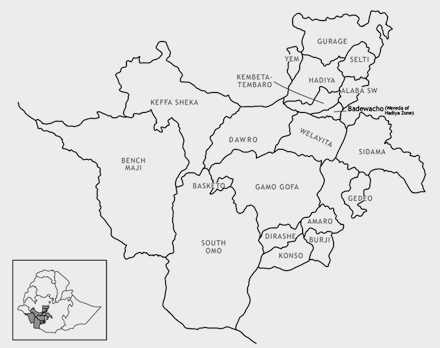Administration
Since the violent overthrow of the government of Mengistu Haile Mariam (known as ‘the Derg’) in 1991, Ethiopia has been governed by the Ethiopian Peoples’ Revolutionary Democratic Front (EPRDF), led by Hailemariam Desalegn, the present Prime Minister. In 1995 the EPRDF introduced a new federal constitution, based on the principle of regional autonomy for sub-national ethno-linguistic groups. The country was divided into nine ‘regional states’. In principle, each major sub-national group was to be dominant in one, and only one, regional state, and each regional state was to be named after its dominant group. In practice, only five regional states could be formed on this principle – Tigray, Amhara, Afar, Somali and Oromiya. In the south west of the country, where there was no obvious ‘dominant group’ around which to form a regional state, a large number of smaller groups, including the Mursi, were formed into the ‘Southern Nations, Nationalities and Peoples’ Regional State’ (SNNPRS), with Awassa as its capital. Regional states are divided into zones and zones into weredas, or districts. Mursiland lies in the Sala Mago Wereda of South Omo Zone.
Zones of the Southern Regional State. Map 6
The capital of South Omo is Jinka, a town of around 20,000 inhabitants, 750 km from Addis and 520 km from the regional capital, Awassa. It has a hospital, a high school, two junior secondary schools, a prison and four main hotels. The main economic activity in the town is trading, mainly in coffee, hides and skins, spices, and livestock. There is a twice weekly market (Tuesday and Saturday).
The population of Sala Mago wereda is made up of three ethnic groups, Mursi and Bodi in the Omo lowlands to the south and Dime in the northeastern highlands. In addition, approximately 7000 agriculturalists from Konso Special Wereda, in the far west of the Region, have been moved into Sala Mago since 2004 under the government’s resettlement programme. They occupy six resettlement villages between Hana, the wereda capital (in Bodi territory), and the Dime market town of Utsa. Until recently, the poor and undeveloped road system in the wereda has been partly responsible for the restricted access the Sala Mago population has had to government services, amounting to less than any other wereda in the Zone. This applies particularly to the Mursi, for whom it is a one or two day walk to reach Hana. However, since


